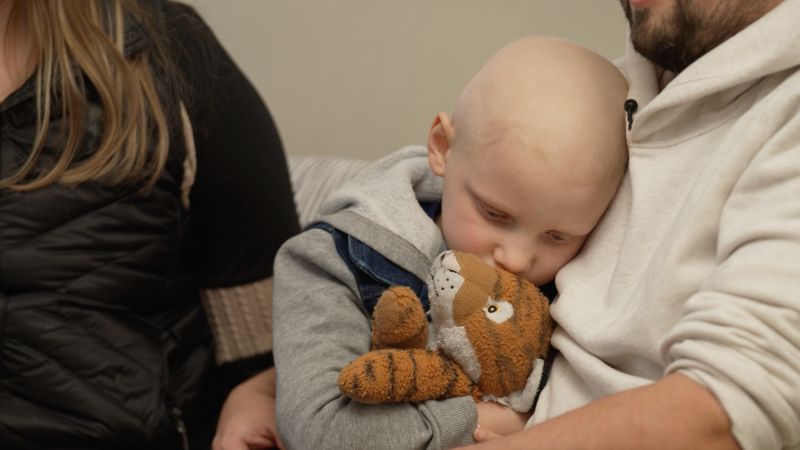Alice Rees initially put the pain under her ribs and nausea that she experienced while on holiday with friends in July 2023 down to indigestion from a cooked breakfast.
But after a day the discomfort hadn’t eased – even with paracetamol and Gaviscon. In fact, it was bad enough to stop Alice, 64, a retired head of safeguarding at a healthcare company, from Birmingham, from walking.
Three days later, on her return home, Alice contacted NHS 111, which advised she go to A&E, where blood tests and an ultrasound scan showed that her pancreas was inflamed.
Follow-up scans were booked for six weeks’ time and, by then feeling fine, Alice expected to get the all-clear.
She was stunned when the consultant phoned to say they were concerned she may have cancer. A few days later, in October, the pancreatic cancer diagnosis was confirmed.
‘I was absolutely floored,’ says Alice, who lives with her daughter, Jessica, 28, – her husband Stuart passed away from a form of head and neck cancer in 2012 at the age of just 55.
‘It was like the world was falling apart – I’d only just put my life back together after losing my husband. All I could think was how Steve Jobs, the founder of Apple, had died from pancreatic cancer – and if he didn’t survive, what hope did I have?’
Pancreatic cancer has a reputation as one of the deadliest forms of the disease, and not without basis: around 10,500 people, mainly over 50, are diagnosed with it in the UK each year – and in 80 per cent of cases it’s too late for effective treatment, according to the charity Pancreatic Cancer UK.
Alice Rees initially put the pain under her ribs and nausea that she experienced while on holiday with friends in July 2023 down to indigestion from a cooked breakfast
More than half die within three months of a diagnosis.
Understandably, the grim statistics make a pancreatic cancer diagnosis feel catastrophic to patients like Alice.
Yet, after decades with little improvement to treatments or survival rates, experts say the tide is turning, with a wave of new developments that could transform the outlook for patients.
Currently, the only chance of a cure is surgery to remove the tumour. But this is only an option for a small proportion of patients whose cancer has not spread beyond the pancreas.
When surgery isn’t possible, chemotherapy and radiotherapy can be used to reduce symptoms, but won’t hold back the disease.
However research has now opened up the possibility of a new drug treatment, known as KRAS inhibitors.
Scientists have known for decades that pancreatic cancer is driven by a signalling pathway known as KRAS, controlled by a gene mutation that 90 per cent of pancreatic cancer patients have.
But there’s been little success in targeting it – until now.
‘In recent years, preliminary studies have shown that KRAS inhibitors are the first big hope for pancreatic cancer in a while,’ says Dr Giulia Biffi, a research leader at the Cancer Research UK Cambridge Institute.
For example, a study published last month in the journal Cancer Research found that patients whose tumours produced less of an enzyme called Mical2 lived twice as long as those who produced high levels of it. It appears to supercharge the KRAS pathway – and deactivating the Mical2 gene in cancer cells dramatically slows this activity.
But it’s not just new treatments that are needed. One of the challenges with pancreatic cancer is spotting it early because it can have vague symptoms – including indigestion, back or stomach pain, changes to bowel habits, unexplained weight loss – which can have many causes.
It’s also not possible to see or feel a lump as the pancreas is deep inside the abdomen.
‘Early detection tools would be a game-changer,’ says Katherine Free, a spokeswoman for Pancreatic Cancer UK.
‘We currently only have scans to detect pancreatic cancer, and you can’t scan everyone with vague symptoms.’
But blood, urine and breath tests under development could soon spot pancreatic cancer at a much earlier stage.
Researchers at Imperial College London are investigating whether the presence of chemicals known as volatile organic compounds (VOCs) in our breath can be a reliable marker for pancreatic cancer. VOCs are created by cancer cells, released into the blood and then breathed out. In an ongoing study, researchers are comparing breath samples from healthy people with those who have pancreatic cancer or other pancreatic conditions. The results are due in the summer and, if promising, will lead to a larger trial later this year.
Meanwhile, scientists at University College London are looking for proteins in the blood which could accurately diagnose the condition early with a blood test.
And Queen Mary University of London is developing a urine test measuring levels of three proteins identified in earlier research as being signs of early-stage pancreatic cancer.
None of these potential breakthroughs can come soon enough for patients like Alice.
To her profound relief, she was told surgery might be an option after having chemotherapy every two weeks for three months to shrink the tumour.
‘I was told many people don’t respond to chemotherapy, and that only 7 per cent make it to five years,’ says Alice. ‘I was determined to be one of them.’
Why chemotherapy alone isn’t effective for this form of the disease could be that – uniquely – pancreatic cancers seem to comprise more non-cancer cells than cancerous ones. ‘Cancer cells can make up as little as 10 per cent of the cancer, while the rest are mainly fibroblast and immune cells,’ explains Dr Biffi.
Fibroblasts normally help maintain tissue structure, but in pancreatic cancer are reprogrammed to support cell growth and to resist treatment, she says.
‘We think existing treatments aren’t effective because pancreatic cancer is so diverse – comprised of many different types of cells – so we need tailored treatments to target the cancerous and non-cancerous cell interactions,’ says Dr Biffi, who is now leading a team looking into this.
Scientists at the Institute of Cancer Research are also investigating whether focused ultrasound, known as histotripsy, can weaken the tough outer layer of pancreatic cancers, making holes in it so that other therapies can reach cancer cells better.
For Alice, discovering the chemotherapy shrank her tumour enough for surgery ‘was like a golden ticket – I knew surgery was my only option’, she says.
In a six-hour operation in March 2024, surgeons removed the head of her pancreas, the lower end of her stomach, duodenum, gallbladder, part of her bile duct and some nearby lymph nodes. Newer surgical techniques could mean more patients might be considered suitable for an operation even if they were not five years ago, explains Ricky Bhogal, a consultant hepatobiliary surgeon at the Royal Marsden Hospital in London.
Recent research by Mr Bhogal, published in the Annals of Surgery Open, showed that when surgeons remove all of the tissue around the main artery supplying the bowel at the same time as removing pancreatic tumours, up to 40 per cent of patients survived for at least five years after surgery – a significant improvement, as previously they would have been unlikely to be considered for surgery.
Even five years ago, this was considered too risky, ‘so that’s been a big shift,’ says Mr Bhogal.
Following a week in intensive care after her surgery, Alice left hospital. She recalls: ‘When I got home it was difficult to sit up or get out of bed, but I slowly managed to walk around on my daughter’s arm.’
Once recovered, Alice had more chemotherapy in the hope of preventing the cancer returning.
Even with surgery, 75 per cent of cancers come back within a year, according to Pancreatic Cancer UK. To improve this, a new personalised vaccine is being trialled at Queen Elizabeth Hospital Birmingham and University College London Hospitals.
It works by using RNA to train T-cells (a type of immune cell) to recognise and attack proteins specific to an individual’s tumour tissue (a sample of which is taken following surgery) should they appear again, explains Khurum Khan, a consultant oncologist at University College London and the Harley Street Clinic.
Alice had a scan last August – it found no trace of cancer.
‘Jessica is getting married this summer and I’ll walk her down the aisle,’ she says. ‘It will be emotional because it should be her dad doing it – but I feel very lucky that I’ll be there.’









